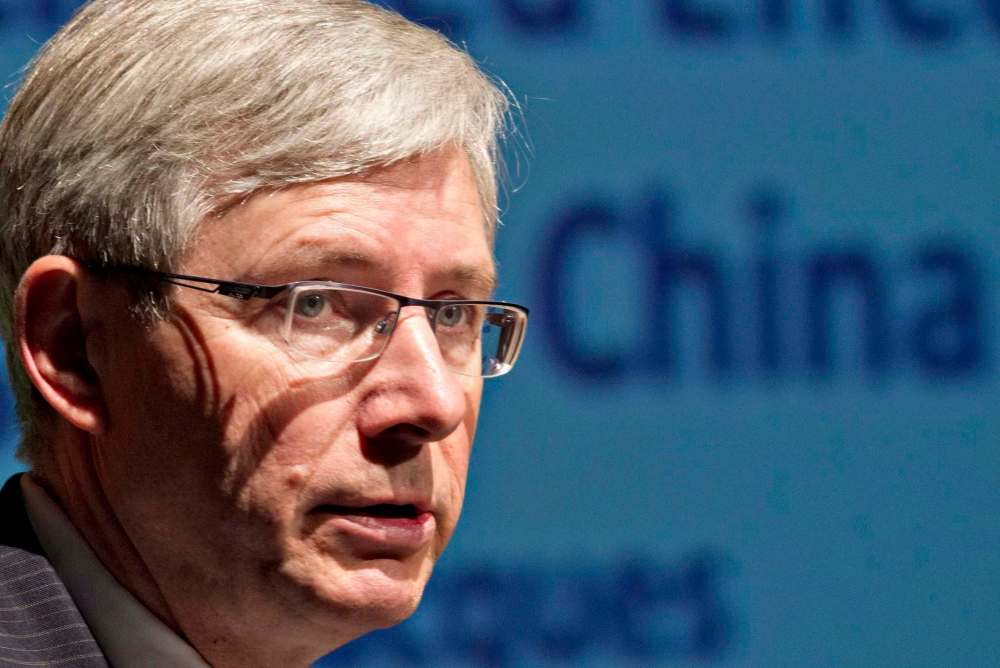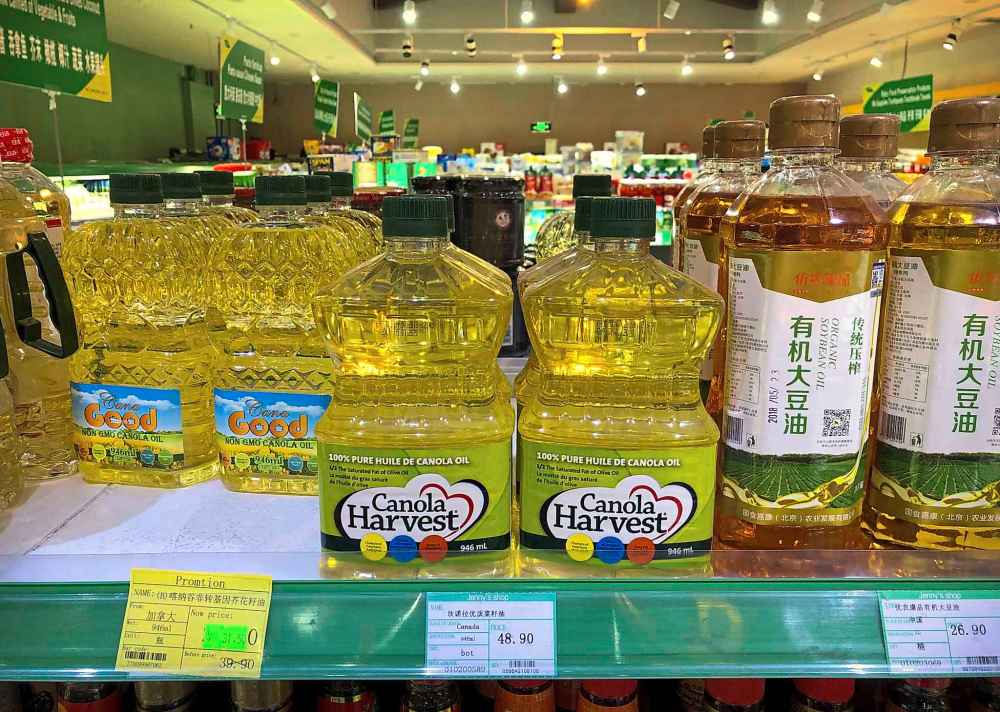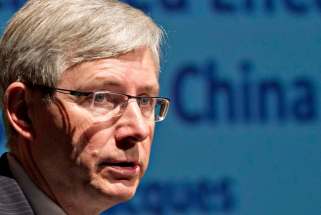Canada-China relations face ‘worst crisis’: former ambassador
Read this article for free:
or
Already have an account? Log in here »
To continue reading, please subscribe:
Monthly Digital Subscription
$0 for the first 4 weeks*
- Enjoy unlimited reading on winnipegfreepress.com
- Read the E-Edition, our digital replica newspaper
- Access News Break, our award-winning app
- Play interactive puzzles
*No charge for 4 weeks then price increases to the regular rate of $19.00 plus GST every four weeks. Offer available to new and qualified returning subscribers only. Cancel any time.
Monthly Digital Subscription
$4.75/week*
- Enjoy unlimited reading on winnipegfreepress.com
- Read the E-Edition, our digital replica newspaper
- Access News Break, our award-winning app
- Play interactive puzzles
*Billed as $19 plus GST every four weeks. Cancel any time.
To continue reading, please subscribe:
Add Free Press access to your Brandon Sun subscription for only an additional
$1 for the first 4 weeks*
*Your next subscription payment will increase by $1.00 and you will be charged $16.99 plus GST for four weeks. After four weeks, your payment will increase to $23.99 plus GST every four weeks.
Read unlimited articles for free today:
or
Already have an account? Log in here »
Hey there, time traveller!
This article was published 25/03/2019 (2448 days ago), so information in it may no longer be current.
OTTAWA — As China’s escalating spat with Canada ensnares canola farmers, Manitobans with ties to the country need to step up, a former ambassador told the Free Press.
Canada’s canola industry declared on Friday that China was blocking all of its seed exports, three weeks after halting Richardson International’s canola-export permit.
It was the latest in a series of measures China has taken since last December’s arrest of Huawei Technologies Co. Ltd. executive Meng Wanzhou in Vancouver, at the request of U.S. tax authorities.

The Free Press spoke with Guy Saint-Jacques, Canada’s ambassador to China from 2012 to 2016, about how the federal Liberals have handled the issue, what options are on the table and how Winnipeggers can get involved.
Q: How bad is this months-long spat?
This is the worst crisis in the bilateral relationship we have faced since we established diplomatic relations in 1970.
When China detained high-profile Canadians, we were able to rally support from a number of countries who issued public statements. It probably took China by surprise and made them think twice before taking further measures. But now they are increasing the pressure.
Cancelling Richardson’s export permit means 30 per cent of our canola-seed exports; that is a huge part of our trade. The growth in our exports to China over the seven years is due in large part to agriculture.
Former ambassador cites spats elsewhere
OTTAWA — China’s restrictions on Canadian canola echo times the country has seemed to retaliate against exporters over political issues, according to Guy Saint-Jacques, Canada’s former ambassador to China.
“China is a champion at using what we call non-tariff barriers,” he said, noting most are “not covered by international laws.”
OTTAWA — China’s restrictions on Canadian canola echo times the country has seemed to retaliate against exporters over political issues, according to Guy Saint-Jacques, Canada’s former ambassador to China.
“China is a champion at using what we call non-tariff barriers,” he said, noting most are “not covered by international laws.”
Last month, China banned coal imports using a testing criteria Saint-Jacques said doesn’t follow an international standard. This came after Australia banned China-based Huawei Technologies Co. Ltd. from operating 5G data networks. Canada is still deciding whether to follow suit.
China similarly hiked its taxes on Australian coal years ago, which had those imports temporarily drop by a third.
In 2017, China organized a year-long boycott of South Korean stores after that country allowed the United States to set deploy an anti-missile system.
For years, China halted imports of salmon and other products from Norway, when the Nobel committee awarded its 2010 peace prize to the incarcerated human-rights activist Liu Xiaobo.
The country banned bananas and other foods from the Philippines in 2012 for four years, after the country disputed China’s construction of artificial islands at a United Nations tribunal.
— Dylan Robertson
Q: Ottawa keeps demanding China’s samples of the “dangerous pests” it claims to have found in Richardson’s canola. The country has instead escalated its agriculture restrictions. What can we do?
China has not offered any evidence about those pests. Knowing how they reacted in the past, it’s probably a dubious claim.
But at the same time, we have to recognize they have legitimate concerns about avoiding contamination of their canola, by any kind of disease like blackleg that would come from Canadian shipments.
We need a common approach between the federal government, the provincial governments — especially in Western Canada — and industry, to say to demonstrate what we can do to increase the safety of our shipments, but also ask them to resume trade right away.
We’re still in talks for our canola agreement with China, which runs September 2016 until March 2020. Those negations are now more urgent because China’s jumped the gun.
Canadian farmers have to decide if they’ll sell canola elsewhere, presumably at a considerably reduced price, or switch to other crops.

Q: Does anything surprise you about this?
It seems China doesn’t care about protecting what I would call a good relationship.
We helped to create the dairy industry over there, we help to considerably improve their pork industry, to train veterinarians and food inspectors. Provinces have hosted Chinese scientists.
In my view, it’s still worth to remind the Chinese of this long-term friendship. They are doing major damage to the relationship.
Q: Does Manitoba have a role to play?
We are at the stage where we have to use all channels. Many Canadian provinces have twinnings with Chinese provinces and they go back a long time. Many former officials have connections with people in China who now occupy more important positions. Some large companies have those contacts.
We need to speaking with one voice, to remind them of all of our collaboration.
We need to use all those channels to impress on the Chinese — and hope that they will plead for us, and be the voice of reason to leadership — that they are doing lots of damage, not only with Canada but other western countries.
Canola restrictions will hurt Chinese citizens: ex-diplomat
OTTAWA — China’s restrictions on Canadian canola will negatively impact the average Chinese person, according to Guy Saint-Jacques, Canada’s former ambassador to China.
“Canola is very well perceived in China, mostly because it carries health benefits,” Saint-Jacques said in an interview. “But when a communist government decides to impose measures, it doesn’t care about importers.”
OTTAWA — China’s restrictions on Canadian canola will negatively impact the average Chinese person, according to Guy Saint-Jacques, Canada’s former ambassador to China.
“Canola is very well perceived in China, mostly because it carries health benefits,” Saint-Jacques said in an interview. “But when a communist government decides to impose measures, it doesn’t care about importers.”
Saint-Jacques said some plants in China that were importing Canadian canola will likely go bankrupt, as they were operating around 40 per cent of their seed-crushing capacity.
“Under China’s current leader (Xi Jinping), it’s now very difficult to criticize the government,” Saint-Jacques said, adding the country lacks any strong consumer association. “If you want to organize a movement, you will be arrested right away and put in jail.”
Few countries have the weather conditions needed to produce canola. “And so it’s clear that the Chinese government — knowing how large a chunk of exports this is — wants to send us a clear message.”
He expects if the United States and China end their tariff war, Canada will have its exports drop as the country switches to American agricultural products.
Although the Liberal government does not have large swaths of support in canola-producing regions, Saint-Jacques said China is targeting a market that will resonate nationally.
— Dylan Roberson
Q: Winnipeg has a Chinese sister city, Chengdu, but few actual ties. Is that a problem?
You have to use all available channels and goodwill.
Q: Can other countries step in?
We have to underline to the U.S. that they have put us in this mess, which could now mean Canadian farmers losing billions of dollars in sales.
Only the U.S. can confront China. That’s why we need a functioning, multilateral system, to help us to impress on China that what they are doing is not acceptable.
Canada has done a lot in trying to lower the temperature, and not put any oil on the fire. China is still concerned by its international reputation.
If we are not able to convince them, we should launch a World Trade Organization complaint. We could end up successful, but only in two or four years. The canola restrictions will have done a lot of damage and exacerbated the relationship.
Meng Wanzhou’s extradition process can take many years. Unfortunately, we are a small partner for China. They can do a lot of damage.
Our new trade agreement with the U.S. and Mexico has a clause suggesting Canada won’t sign a free-trade agreement with China in the near future. That very important point of leverage is now gone.
Q: You were appointed by then-prime minister Stephen Harper. The current Conservatives say Canada’s lack of an ambassador is worsening the situation, and Prime Minister Justin Trudeau ought to phone Chinese President Xi Jinping. Would either help?
It does not make a huge difference at this point.
China has refused to meet with anyone unless we come up with a guarantee Meng Wanzhou will be free and, of course, we cannot do that.
It’s always better if you have a full-fledged ambassador. But China restricts ambassadors’ access to key decision-makers.
Phoning Xi Jingping doesn’t make any sense. Chinese leaders are often not wiling to take calls unless it’s from a major country. That is the last recourse, and you must first have done a lot at the stage of diplomats and governing officials.
dylan.robertson@freepress.mb.ca
This interview has been edited and condensed for clarity.









